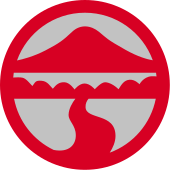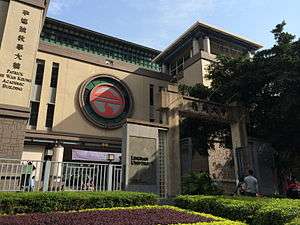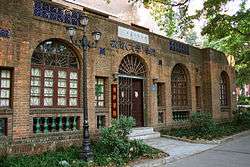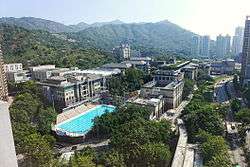Lingnan University
Lingnan University (LN/LU), formerly called Lingnan College, is the only public liberal arts university in Hong Kong. It aims to provide students with an education in the liberal arts tradition[4] and has joined the Global Liberal Arts Alliance since 2012.[5] Lingnan University became the first university in Hong Kong to accomplish the goal of providing rich hostel experience for all undergraduates and currently, 80% Lingnan students are able to go on exchange for a term during their undergraduate study.[4]
嶺南大學 | |
 | |
Former names | Canton Christian College in Guangzhou Lingnan School in Hong Kong Lingnan College (1978-99) |
|---|---|
| Motto | 作育英才,服務社會 (Education for Service) [1] |
| Type | Public |
| Established | 1888 |
| Chairman | Yao Cho-fai, Andrew |
| Chancellor | Chief Executive of Hong Kong (Current officeholder: Carrie Lam) |
| President | Prof Leonard K Cheng |
| Vice-president | Prof Joshua Mok Ka-ho |
| Dean | Yeh Yueh-yu, Emilie (Arts) Leng Mingming (Business) Siu Oi-ling (Social Sciences) |
| Students | 3,691 (2019–2020) [2] |
| Location | , Hong Kong |
| Colours | Red and Grey [3] |
| Affiliations | AALAU, ASAIHL, ACUCA, GLAA |
| Website | www |
| Lingnan University | |||||||||||||
|---|---|---|---|---|---|---|---|---|---|---|---|---|---|
| Traditional Chinese | 嶺南大學 | ||||||||||||
| Simplified Chinese | 岭南大学 | ||||||||||||
| |||||||||||||
| Lingnan College | |||||||||||||
| Traditional Chinese | 嶺南學院 | ||||||||||||
| Simplified Chinese | 嶺南学院 | ||||||||||||
| |||||||||||||
In 2015, Lingnan University was selected as one of the "Top 10 Asian Liberal Arts Colleges" by Forbes.[6]
In 2020, the University have come in 2nd worldwide for “Quality Education” in the Times Higher Education University Impact Rankings 2020.
| University rankings | |
|---|---|
| Global – Overall | |
| QS World[7] | 601-650 (2018) |
| Regional – Overall | |
| QS Asia[8] | 123 (2018) |

Lingnan University has 3 faculties, 16 departments and 19 undergraduate degree programmes of a broad range of disciplines in humanities, social sciences and business administrations. All undergraduates are required to take 33 credits of Core Curriculum courses, 18 credits of Chinese and English language courses, 48 credits of major courses and 21 credits of free elective courses.[9] Lingnan also offers a great variety of taught masters, research masters and PhD programmes, and there are over 3,000 students in total studying in the small liberal arts university.[10]
At Lingnan University, liberal arts education is achieved through the following:[11]
- Deliberately small enrolment
- Broad-based curriculum
- Close staff-student relationship
- Rich residential life and extra-curricular activities
- Active community service and multi-faceted workplace experience
- Strong alumni and community support
- Global learning opportunities.
Research performance
UGC Research Assessment Exercise 2014
The 2014 Research Assessment Exercise (RAE) published by University Grants Committee in Hong Kong shows that:[12]
- Department of Economics: ranks 3rd among all the eight UGC-funded institutions in its 4-star rating at 13%, which is above the sector-wide 11%, and LU is the only institution which does not have any research output in the “Unclassified” category among all Economics cost centers.
- Department of History: has 15% 4-star rating, which puts the department in the 4th position among all institutions;
- Department of Philosophy: has 45% of 4-star and 3-star outputs, which is just 3 points below the top institution and above the sector-wide 40%;
- Department of Translation: has 15% of 4-star and 3-star outputs, which is the best result among all institutions and above the sector-wide 11%;
- Department of Visual Studies: has 28% of 4-star and 3-star outputs, making LU ranks second among the institutions and is above the sector-wide 19% (in the “Other Arts/Humanities” cost centre );
- Social Studies: has 25% 4-star and 3-star outputs. LU ranks second among the institutions and is above the sector-wide 19%.
UGC General Research Fund (GRF) Results 2015/16
LU's overall success rate of 36.1% ranks second among the institutions and is above the sector-wide 34.9%.[12]
- Humanities and Social Sciences: LU's success rate of 47.4% is the highest among the institutions and above the sector-wide 32.7%.
- Humanities & Creative Arts: LU's 80% success rate is top among the institutions (sector-wide 40.6%).
- Mechanical, Production & Industrial Engineering: Together with another institution, LU takes the second position among all with a success rate of 50%, and is not far from the top rate of 56.4%.
- Education: LU's success rate is 100% while the sector average is 34%.
UGC Early Career Scheme (ECS) Results 2015/16
LU's success rate of 71.4% is the highest among the institutions while the sector average is 39.9%.[12]
- Humanities and Social Sciences: LU also comes first under this panel with a success rate of 66.7% while the sector average is 34.3%.
- Humanities & Creative Arts: LU's success rate is 100% and the sector average is 47.8%, which makes it rank third in terms of the total amount of funds obtained in this discipline.
- Business Studies (with Economics): LU's success rate is 100% while the sector average is 33.8%.
History
Canton Period

Lingnan University was founded as Canton Christian College in Guangzhou, China as a Non-Denominational Christian university by the American Presbyterians (North) Council in 1889.
The school changed location several times over the years. In 1900, the school was relocated to Macau due to the Boxer Rebellion. The school moved back to Guangzhou and built a permanent campus at the Haizhu District in 1904.
The university moved to Hong Kong for the first time in 1938 after Guangzhou fell to the Japanese military. The university stayed in Hong Kong for 4 years before moving to Shaoguan after Hong Kong's capitulation to the Japanese forces.
After World War II concluded, Lingnan University moved back to its permanent campus at Haizhu.[13]
Lingnan School
After the communist revolution in Mainland China, the university remained in Guangzhou, and was merged into Sun Yat-sen University in 1952.
In 1967, the Lingnan Secondary School board of directors, along with the Lingnan University Hong Kong Alumnus Club and Lingnan Club founded the Lingnan Education Expansion Council, and began to organise the Lingnan School in Hong Kong. In the formative years, the school only provided preparatory form (Sixth Form) education and non-degree programmes.
During the 1970s, Lingnan School began to offer diploma programmes in such subjects as liberal arts, commerce, and social science.
Lingnan College
At the end of 1978, the colonial government in Hong Kong issued a White Paper on post-secondary education. Lingnan accepted the government's suggestions, and abolished the 4-year system that is used in other universities around the world in favour of the "2-2-1" regimen (2 years of preparatory courses, 2 years of study for higher diplomas, 1 more year for an honours diploma). At the same time, the school was registered as an Approved Post Secondary College, and changed its name to Lingnan College.
During the 1980s, the school began to focus its resources on Social Science, Commerce, and Literature programmes, and shut down its other programmes, such as Music and Science, to conserve funding. In 1985, an interdisciplinary degree programme was established.
Lingnan's speed of development increased as the 80s drew to an end, due to the colonial Hong Kong government's policy of expanding higher education. At the same time, the preparatory courses that were first mandated by the government in 1978 were steadily abolished.
Lingnan University

In 1991, the Lingnan College received funding from the Hong Kong government directly after it passed an academic accreditation review from the Hong Kong Council for Academic Accreditation (HKCAA).
During the 1990s, the University's development as a Liberal Arts university was confirmed by the school's board, and the school moved to its permanent location in Tuen Mun in 1995, the former site of Bowring Camp, a British Forces barracks. The school began to receive authorisation to open bachelor courses in 1992, then master courses in 1996, eventually receiving self-accreditation status and full recognition as a university by the government in 1998, and renaming the institution as Lingnan University on 30 July 1999.[14]
In 2007 Professor Edward Chen retired after his 12 years as president. Professor Yuk-Shee Chan, ex-vice-president of Hong Kong University of Science and Technology become the new president. Lingnan University is now preparing the new "334" system which is planned for introduction in 2012; in the new system, a new 120-credit programme will be divided into parts, e.g. General Education, Ethics. In addition, to prepare for the four-year university system, construction of Lingnan University's new academic building, Simon and Eleanor Kwok Building, has been completed, providing more teaching and learning facilities for the Faculty of Business. Located adjacent to the existing campus and near Fu Tai Estate, the Simon and Eleanor Kwok Building is built on a 4,674-square metre site and has a gross floor area of 5,178 square metres.
Academic organisations
Faculties and departments
Faculty of Arts
- Department of Chinese
- Department of Cultural Studies
- Department of English
- Department of History
- Department of Philosophy
- Department of Translation
- Department of Visual Studies
- Centre for English and Additional Languages (CEAL)
- Chinese Language Education and Assessment Centre (CLEAC)
- Animation and Digital Arts Programme Office
- Wong Bing Lai Music and Performing Arts Unit
Faculty of Social Sciences
- Office of the Faculty of Social Sciences
- Department of Applied Psychology
- Department of Economics
- Department of Political Science
- Department of Sociology and Social Policy
Faculty of Business
- Department of Accountancy
- Department of Computing and Decision Sciences
- Department of Finance and Insurance
- Department of Management
- Department of Marketing and International Business
School of Graduate Studies
Core Curriculum and General Education Office
- Science Unit
Student life
Representative Council
| Period | Chairperson | Vice Chairperson | Secretary | Chairperson of Finance Committee | Chairperson of Constitution Revising Committee | Chairperson of Auditing Committee | Chairperson of Monitoring Committee | Chairperson of Election Committee | Chairperson of Affiliated Clubs' and Societies' Affairs Committee | Chairperson of associate degree Programme Affairs Committee |
| 46th | Haven Yu | Teli Tang | Irene Lam | Justin Lo | Yip Ka-cheong | King Wong | Lee Pik-wah | Dennis Leung | – | |
| 45th | Kenny Yeung | Yuen Hon-ming | Kevin Chau | Charles Yau | Janice Kwan | Dicky Kwan | Dexter Pang | Jonathan Chan | – | |
| 44th | Leo Tang | Vivian Li | Joseph Tong | Yoyo Kwan | CY Tsang | Elvis Siu | Siu Tsz-ching | Kitty Wong | – |
Executive Council
| Period | Name | President | Vice-President | External Vice-President | Financial Officer | general secretary | Internal Secretary | External Secretary | University Affairs Officer | Academic Affairs Officer | Current Affairs and China Proper Track Officer | Public Relations OFficer | Recreation Officer | Information Management Officer | Publication Officer | Welfare Officer | Social Movements Officer | Human Capital and Resources Management Officer | International Communication Officer |
| 46th | 逆風 | Vivian Yip | Sonia Tsang | Cindy Ng | Branting Lai | Chan Wai-ning | Patience Wong | Gary Mak | Max Wu | Ronnie Lam | – | Kelly Lee | Ho Yiu-fai‡ | Leung Chi-hin‡ | Clara Chan | Manyi Cheung | – | – | – |
| 45th | 狂瀾 | Eddie Chan | Natalie Wu | Willis Ho | Lok-pui Lum | Mandy Chow | Stephanie Kwok | Lai Tsz-yeung | Haven Yu | Amis Kwok | Yu Wai-pan | Ho Yan-ming‡ | Chan Sze-yan‡ Eddie Yip† | Chun Hei-tung‡ | Koey Lee | Au Wai-ho† | Law Kun-kit | ||
| 43rd | 鼎築 | Howard Cheng | Isabel Chang | Leo Tang | Ho Hung-hing | Lilian Ngan | Lucy Zhao | Debby Chan | Gary Chan | Liu Tsz-lam | – | Pandora Wong | Li Hua-zhen | Xathieur Yue | Kristy Ho | Chris Wong | – | – | – |
† Resigned ‡ Added
Press Bureau
| Period | Name | Editor-in-Chief | Vice Editor-in-Chief (Administrative Board) | Vice Editor-in-Chief (Editorial Board) | Financial Secretary | general secretary | Public Relations Officer | Art Director | Editor |
| 46th | 甦 | Manni Cheung | Chichio Suen | Sylvia Lam | Remoni Choi | Alice Lam | Christine Lee | Wayne Wong Wong Chung-ying | Tracee Law† Lau Cheung-Yee Helen Yeung Emn Kwan Fiona Ko Mankei Tse Ruby Yiu Ryan Tai |
† Resigned ‡ Added
Business Administration Society
- Senate of Business Administration Society of Lingnan University Students' Union
- Executive Committee of Business Administration Society of Lingnan University Students' Union
Students' Residence
Lingnan considers "hostel life" (life in college dormitories) a form of informal education. As a result, all full-time undergraduate students are required to stay at student hostels on campus for at least one academic year while at the university. A majority of students stay for two academic years. Newly admitted four-year students are required to be residents of student hostels for at least two years, and are guaranteed full residence throughout their stay should they agree upon it.
In addition to another new student hostel building under construction, there are currently eight blocks of student hostels in Lingnan University; each hostel holds an estimated 250 people.
Controversies
July 2019: Students and alumni petition for dismissing Junius Ho as the member of University Council
In 2019 Yuen Long attack, there was an online video widely circulated. Junius Ho, who was a member of the University Council, was found to shake-hand and to take photo with the mob dressed in white attacking passengers at Yuen Long Station platform[15][16] Ho Claimed that he was not involved into the attack, but many students and alumni had no confidence on him. A number of student bodies and alumni associations had made declaration condemning his support on the attack and hate speech, which seriously affect the image of Lingnan University. They also jointly request Chief Executive Carrie Lam to dismiss Junius Ho as the member of University Council. The University issued a statement afterwards stating the irrelevancy between the stance of University and the actions of Ho. The statement also highlighted their respect on freedom of speech.[17][18]
Notable alumni
| Name | Faculty | Graduation Year | Notable Remark |
|---|---|---|---|
| Andrew To | Social Sciences | 1990 |
|
| Joseph Lee | PhD | 2002 | Legislative Councillor |
| Herman Yau | Master of Cultural Studies | 2008 | Film Director |
| Benny Chan | Social Sciences | Actor | |
| Vanessa Yeung | Business Administration | 1994 | Model |
Office of Service-Learning
In 2006, Lingnan University became the first local university to establish an Office of Service-Learning.[19][20]
From 2007 to 2013, the Office of Service-Learning and Lingnan University jointly organised the biennial 1st to 4th Asia-Pacific Regional Conference on Service-Learning.[21][22][23][24][25]
See also
- Liberal Arts
- Lingnan University Library
- Education in Hong Kong
- List of universities in Hong Kong
- List of buildings and structures in Hong Kong
References
- "校長歡迎辭 (Chinese)". Lingnan U. Retrieved 29 July 2014.
- "Statistics of Students". Lingnan University. Retrieved 6 September 2018.
- "嶺南大學 : 歷史和發展". Retrieved 25 July 2015.
- "Lingnan University : Characteristics of Lingnan's Liberal Arts Education". Retrieved 25 July 2015.
- "Lingnan University : Corporate e-News". Retrieved 25 July 2015.
- Sergei Klebnikov. "Lingnan University – In Photos: Top 10 Asian Liberal Arts Colleges". Forbes. Retrieved 25 July 2015.
- "QS World University Rankings 2018". 6 June 2018. Retrieved 6 June 2018.
- "QS University Rankings: Asia 2019". 6 June 2018. Retrieved 6 June 2018.
- "Lingnan's Liberal Arts Education - Teaching and Learning - Lingnan University". www.ln.edu.hk. Retrieved 14 March 2018.
- "學生統計數字 - 資料與統計數字 - 認識嶺大 - 嶺南大學". www.ln.edu.hk. Retrieved 14 March 2018.
- "嶺大的博雅教育 - 教與學 - 嶺南大學". www.ln.edu.hk. Retrieved 14 March 2018.
- https://www.ln.edu.hk/research
- Wang, Dong. Managing God's Higher Learning: U.S.-China Cultural Encounter and Canton Christian College (Lingnan University) 1888–1952. Lanham, MD: Lexington Books, 2007.
- "Chapter 1165: Lingnan University ordinance" (PDF). Hong Kong government. 30 July 1999. Retrieved 20 April 2010.
- "向白衣人豎姆指片段瘋傳 何君堯:我與打人事件絕無關係 只是晚飯後經過 | 立場報道 | 立場新聞". 立場新聞 Stand News. Retrieved 10 November 2019.
- "何君堯稱與元朗白衣人打黑衣人事件絕對無任何關係 - RTHK". news.rthk.hk (in Chinese). Retrieved 10 November 2019.
- "嶺大學生校友聯署 促罷免何君堯校董職位 嶺大:其言論與校方無關 | 立場報道 | 立場新聞". 立場新聞 Stand News. Retrieved 10 November 2019.
- 鄺曉斌 (22 July 2019). "【元朗黑夜】嶺大與何君堯割席:尊重言論自由 不代表校方立場". 香港01 (in Chinese). Retrieved 10 November 2019.
- "Lingnan University Milestones". Lingnan University. Retrieved 12 August 2017.
- "Office of Service-Learning Lingnan University Milestones". Lingnan University. Retrieved 12 August 2017.
- "1ST ASIA-PACIFIC REGIONAL PACIFIC REGIONAL PACIFIC REGIONAL CONFERENCE ON CONFERENCE ON SERVICE- SERVICE-LEARNING" (PDF). Lingnan University. Retrieved 13 August 2017.
- "THE 6TH PAN-ASIAN INITIATIVE ON SERVICE-LEARNING & THE 2ND ASIA-PACIFIC REGIONAL CONFERENCE ON SERVICE-LEARNING Crossing Borders, Making Connections: Service- Crossing Borders, Making Connections: Service-Learning in Diverse Communities Learning in Diverse Communities Learning in Diverse Communities Lingnan University, 2009" (PDF). Lingnan University. Retrieved 13 August 2017.
- "The 3rd Asia-Pacific Regional Conference on Service Learning: Make a Difference: Impacts of Service-Learning". Lingnan University. 9 August 2017. Retrieved 9 August 2017.
- "The 4th Asia-Pacific Regional Conference on Service-Learning". Lingnan University. 9 August 2017. Retrieved 9 August 2017.
- "4th Asia-Pacific Regional Conference on Service-Learning- Call for Award Submissions". Canadian Alliance for Community Service Learning. 9 August 2017. Archived from the original on 9 August 2017. Retrieved 9 August 2017.
External links
| Wikimedia Commons has media related to Lingnan University (Hong Kong). |